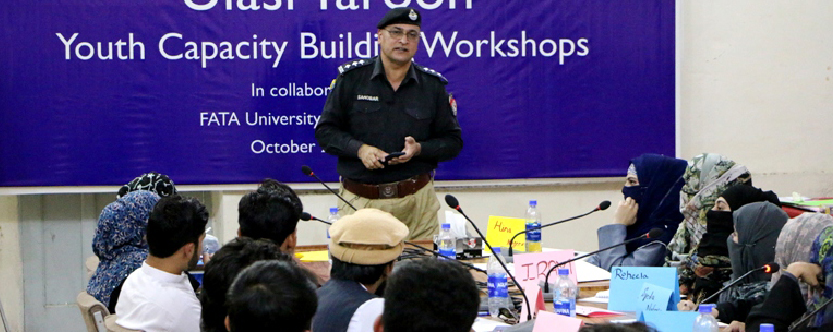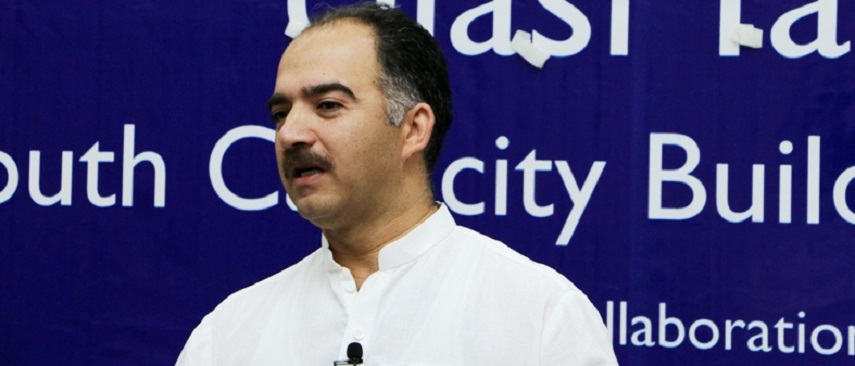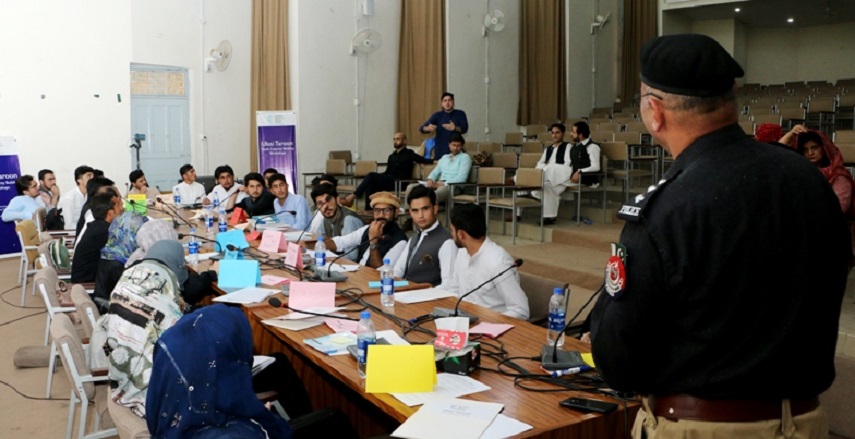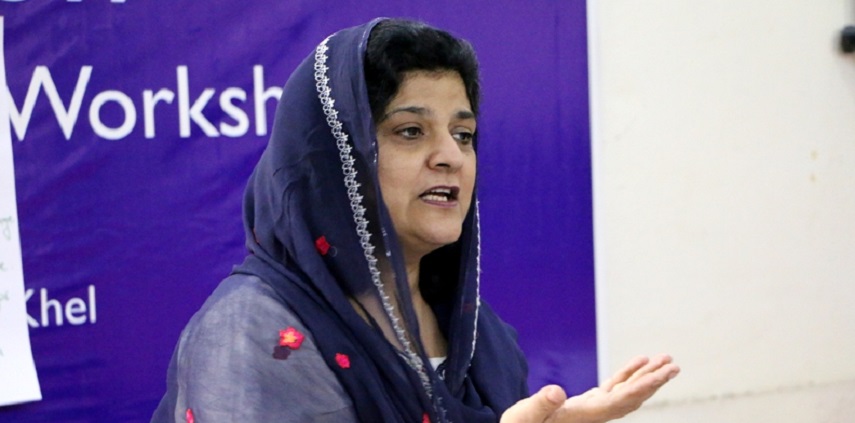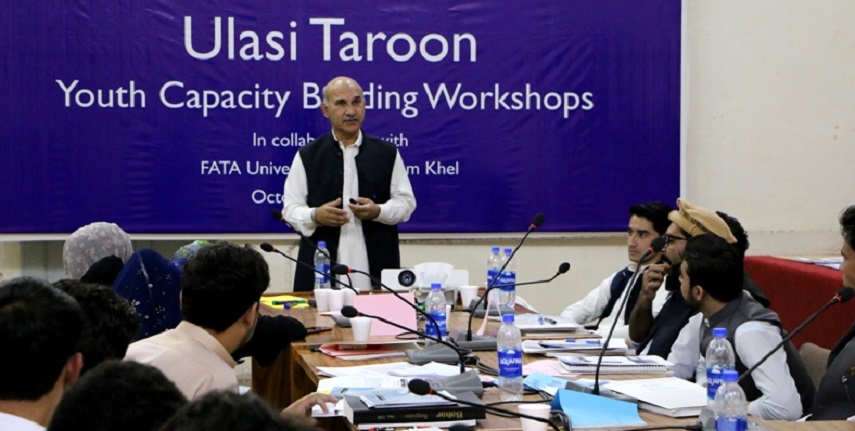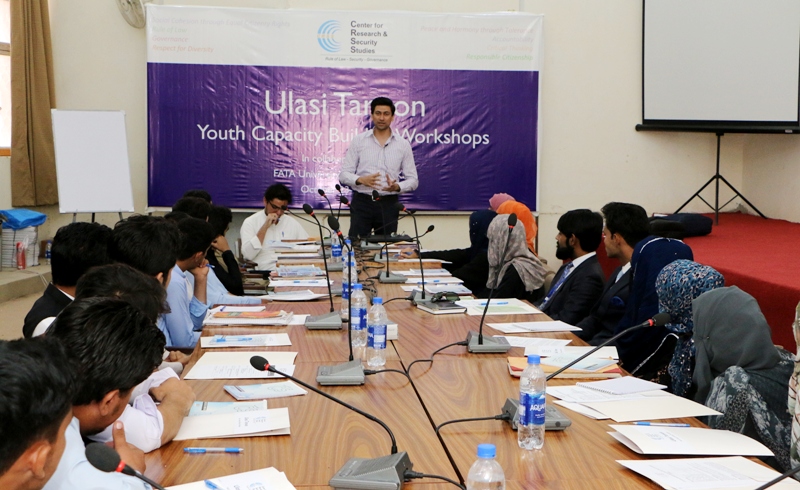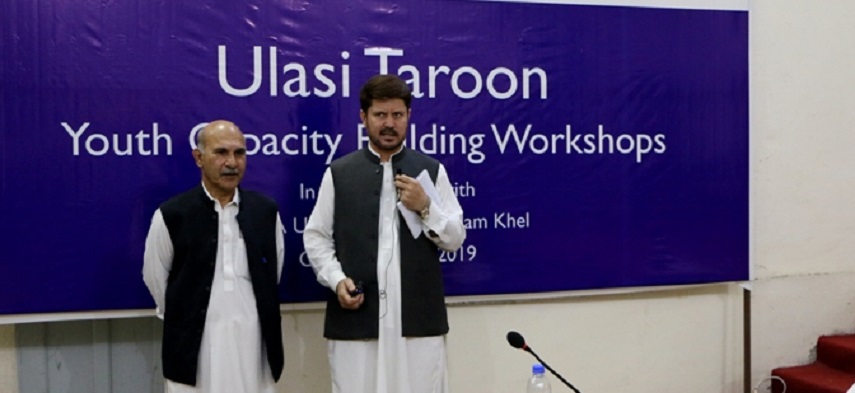One of the essential elements of inclusive democracy is complaint redressal mechanism to address the issues that concern the citizens the most, said Dr. Jamil Ahmad Chitrali from Institute of Peace and Conflict Studies, University of Peshawar during the 22nd round of Ulasi Taroon, Youth Capacity Building Workshops organized by the Center for Research and Security Studies (CRSS) at and in collaboration with FATA University, F.R. Kohat.
He said that the responsive governance rests upon the critical feedback of all the public and private sector stakeholders to improve the service delivery through an inclusive process. The merger of tribal districts augurs well for the socio-political and economic progress of the region as it will harness the potential of tribal people for national development. At the core of inclusive democracy is indiscriminate accountability and transparency that can in turn strengthen the institutions.
Conflict is one of the most misunderstood concepts where the conflict of ideas and different opinions living in the society ultimately lead to the socio-political growth and adds to the society’s collective wisdom. Democracy nourishes with freedom of expression where citizens share their diverse perspectives with respect and understanding.
He concluded that merger of tribal districts has come with opportunities as well as challenges, however we have to be a bit patient.
Mr. Sanober Khan, Deputy Superintendent of Police (DSP) Headquarters, Kohat said that rule of law means that everyone is subject to and equally accountable before law, regardless of the socio-political and economic backgrounds. KP police – through its massive reformation – have different services on offer which are oriented for public welfare, safety and security and to meet the policing needs of the communities.
The role of students from the newly merged districts in exceptionally important to uphold rule of law. They can not only promote the prerequisites and virtues of rule of law but also act as inspiring examples by being law abiding citizens. Upholding rule of law is not only the responsibility of police but an equal onus is on the society. Only by adherence to law, can you uphold rule of law.
There is a dire need to educate the tribal people about their rights as equal citizens; to enable them effectively exercise the rights constitutionally available to them. Rule of law in former FATA will be a gradual process. It requires cognizance of the importance of respect for core constitutional values of respect and equality.
Mrs. Shagufta Khalique, educationist, said that the universal declaration of human rights completely resonates with our core constitutional values about fundamental rights available to the citizens. Responsible citizenry demands paying respect to fundamental human rights as both a reality and an essentiality. Pakistan has rich religious, cultural and ethnic diversity and respecting this diversity is critical to peaceful coexistence of the people from these diverse backgrounds. As a matter of social inclusion, every citizen is an important member of a society. So we must respect people regardless of differences in terms of religion, culture, tradition, color, cast, political views etc. Learning about other faiths can help building interfaith harmony in the society. Inter-religious and intra-religious dialogue at the different forums can ameliorate the misunderstandings about other faiths. Such dialogues can use faiths as connectors in the diverse societies and build better understanding of and address misperceptions about others’ religions.
She said that prerequisites for sustainable conflict resolution are the skills of communication, listening and empathy with refined analytical skill. Youth as future leaders must equip themselves with these skills to be the effective peacebuilders.
Mr. Ghulam Mustafa, Dean FATA University said that Ulasi Taroon Youth Capacity Building Workshops are helping the former FATA youths to channelize their potential into community development. It will also equip them with the peacebuilding tools to cultivate tolerance perspectives both within their own attitudes and the communities at large.
He thanked CRSS for providing such lifetime opportunities for the FATA youths which are tailored to their needs of potential for social development. We need such initiatives here more than any other part of the province.
Mr. Malik Mustafa, Manager Programs, CRSS said that critical thinking – albeit – is a problem solving skill but in its true application, it is much more than that. It’s not merely a criticism but a prism and a perspective to look at any situation where you have a clear vision – critical to inform your decision – of all the potential aspects of that issue. Critical thinking is about developing your understanding and opinion on the basis of all the available information and using research based evidence to support your arguments and ideas.
Youth must comply with the core constitutional values of respect, equality, tolerance and rule of law to foster social cohesion in the society.
Ulasi Taroon is a counter radicalization initiative of CRSS that aims to address the radicalization challenges, extremist ideologies and foster social cohesion through a discourse anchored in the core constitutional values which are fundamentally essential prerequisites for social peace and harmony. The endeavor aims to cultivate and sensitize the youth – in the universities across KP – in the core values in the Pakistani constitution and our social contract. It’s an attempt to highlight the criticality of abiding by these ideals – such as adherence to rule of law, primacy and sanctity of constitution, equal citizenry, responsible citizenship, respect for fundamental human rights, tolerance for diversity and different opinions, inclusive democracy and good governance – as a measure of fostering social cohesion and peaceful co-existence.

